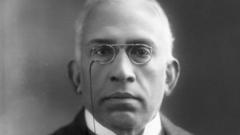

Sir Chettur Sankaran Nair, an often-overlooked figure in Indian history, dared to confront the British Empire head-on, challenging the official narrative of the Jallianwala Bagh massacre. Born in 1857 in Kerala, Nair was a distinguished lawyer, judge, and statesman who rose to prominence during British rule, yet never compromised his commitment to Indian self-governance and justice.
Nair's career was marked by significant achievements. He became the youngest president of the Indian National Congress in 1897, served as a judge in the Madras High Court, and was appointed to the Viceroy's Executive Council in 1915, holding the education portfolio. Despite holding these high-ranking positions, his principles remained unwavering.
The Jallianwala Bagh massacre on April 13, 1919, proved to be a turning point. British troops, under the command of Brigadier General Reginald Dyer, opened fire on a peaceful gathering of unarmed Indians, resulting in the deaths of hundreds and injuries to over a thousand. This horrific event shook the nation and stirred Nair to take a bold stand against the British Raj.
In protest against the massacre and the government's handling of the aftermath, Nair resigned from the Viceroy's Executive Council. This was a significant sacrifice, as he relinquished a position of power and influence. However, Nair believed that remaining silent would be a betrayal of his conscience and his country.
Nair further challenged the British narrative through his 1922 book, "Gandhi and Anarchy." In it, he directly accused Sir Michael O'Dwyer, the Lieutenant Governor of Punjab, of being responsible for the atrocities committed during the Punjab Disturbances, including the Jallianwala Bagh massacre. This act of defiance led to a libel suit filed by O'Dwyer against Nair in London.
The O'Dwyer v. Nair Libel Case, held in 1924, became a landmark legal battle. Nair presented evidence to expose the truth about the massacre and the excessive use of force by the British administration. Although Nair ultimately lost the case, with the jury siding with O'Dwyer, the trial served a crucial purpose. It brought the issue of Jallianwala Bagh to international attention, shedding light on the brutality of British rule in India.
The trial exposed the deep-seated biases within the British system. Despite losing the case and being ordered to pay damages, Nair refused to apologize, standing firm on his conviction that he had spoken the truth. His courage inspired many Indians and further fueled the growing nationalist movement.
Nair's actions had far-reaching consequences. Rabindranath Tagore, the Nobel laureate, renounced his knighthood in protest against the massacre. Mahatma Gandhi, initially hesitant, launched the non-cooperation movement, marking a significant turning point in India's struggle for independence. Nair's story serves as a reminder of the power of individual courage in the face of injustice. He used his position and his voice to challenge the might of the British Empire, bringing the truth about Jallianwala Bagh to the world stage. His legacy continues to inspire generations of Indians to stand up for what is right, even when faced with overwhelming odds. A film titled Kesari Chapter 2 was released on April 18, 2025, based on the events of Jallianwala Bagh Massacre and the life of Sankaran Nair.